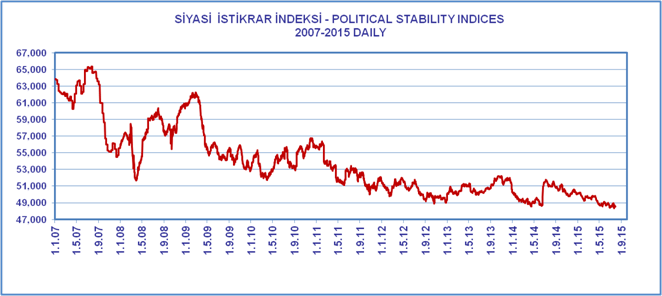Is Erdoğan warmongering for political power?

I am not a fan of conspiracy theories at all. In fact, even the London pub
Grenadier’s famous Bloody Marys were not enough to convince me of some of the more plausible conspiracies during my last trip to the city. However, I am also a numbers-guy and some data I recently stumbled upon are forcing me to believe the unbelievable.
Istanbul firm
S Informatics Consulting has been compiling their Fovea Oberaza index of political stability and risk for nearly two decades. Modeled after the World Bank’s well-known
governance indicators, the index is made up of data in nine sub-categories: Basic legitimacy and decisiveness of governance norms, parliament support and structure, the functioning and current formation of the government, efficiency and governance, relations with institutions, relations with foreign political actors, bureaucratic capacity and usage, political violence and economic factors.
Anyone even faintly familiar with recent developments in Turkey would not be surprised that the index is at an all-time low. But what really intrigued me was a simple graph of two of the sub-indices in Turkish news and infographic website manset.at by my good friend (and fellow Beşiktaş fan), Tarık Yılmaz. Efficiency and governance, which is, according to S Informatics founder and CEO Serdar Sement, a proxy for support for the ruling Justice and Development Party (AKP), seemed to be increasing in response to the rising political violence.

Appearances can be deceiving and so I dusted off my statistics software and calculated standard and rolling correlations, confirming that the two sets are indeed moving together. However, correlation does not mean causation, so I ran some statistical tests to check for causality as well. Lo and behold, my analyses showed that, indeed, support for the AKP increased after episodes of rising political violence. Interestingly enough, tests in shorter time intervals suggested an asymmetric relationship. Declines in political violence led to only minor falls in the AKP’s political efficiency and governance.
I should add that these assessments are not 100 percent conclusive.
Granger causality, one of the most popular of these causality tests, merely checks if one event precedes another. Relying solely on it would lead one to conclude that Christmas is caused by Christmas cards. Therefore, one cannot prove that President Recep Tayyip Erdoğan is warmongering for political power --just as one cannot know for sure if he wants the Peoples’ Democratic Party (HDP) deputies’
immunities lifted to ensure majority for the AKP in the likely re-elections. Besides, even if he is, Sement thinks he may not succeed this time around because conditions are very different.
However, both conspiracy theories are in fact variants of the same theme- Erdoğan doing all it takes to become an all-powerful president. And when evidence piles up like this, one cannot help but think, “what if.” At this point, with the army bombing both Kurds and the Islamic State, and a
proceedings summary to lift HDP co-chair Selahattin Demirtaş’s immunity prepared less than a day after Erdoğan’s remarks, I don’t even need Bloody Marys to be convinced.
 I am not a fan of conspiracy theories at all. In fact, even the London pub Grenadier’s famous Bloody Marys were not enough to convince me of some of the more plausible conspiracies during my last trip to the city. However, I am also a numbers-guy and some data I recently stumbled upon are forcing me to believe the unbelievable.
I am not a fan of conspiracy theories at all. In fact, even the London pub Grenadier’s famous Bloody Marys were not enough to convince me of some of the more plausible conspiracies during my last trip to the city. However, I am also a numbers-guy and some data I recently stumbled upon are forcing me to believe the unbelievable.
